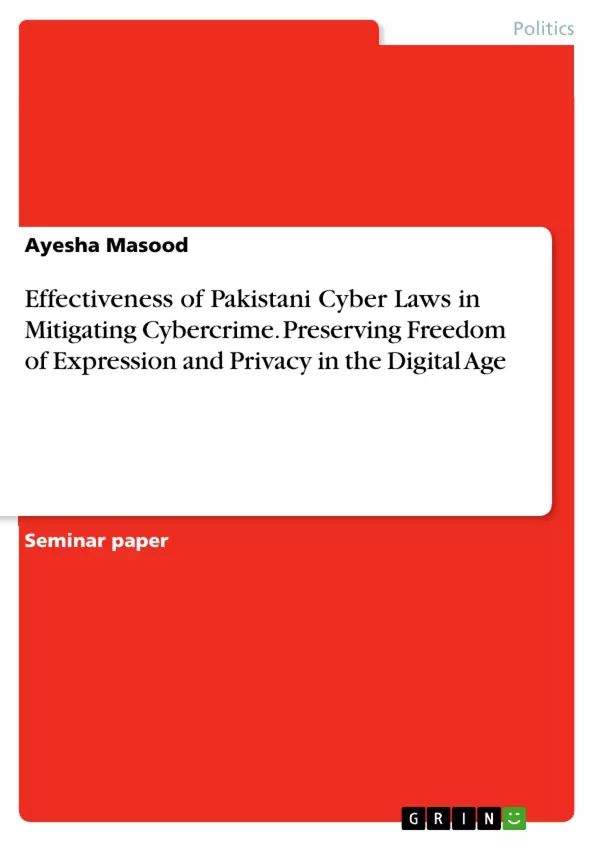In Pakistan, the freedom of expression is a constitutional right guaranteed to every citizen. It is not the absolute right as it has many limitations attached. This research report intends to explore the status of freedom of expression provided by the Constitution of Pakistan 1973 and International Conventions. This research explores, firstly, the basic concept of freedom of expression, and challenges faced by online social media users. Secondly, it discusses the significance of this study and throws lights on the aims and objectives to be achieved. Furthermore, it states the research questions which generate the main idea of the topic. The research methodology used in this research paper is qualitative data and this data is collected from various sources such as books, reports, articles and material which are published by government and non-governmental organizations. Lastly it discusses the structure of study which is further divided into six parts and entails chapters which will further elaborate the points of discussion.
Table of Contents
- Abstract
- List of Abbreviations
- Chapter 1: Introduction
- 1.1. Introduction
- 1.2. Significance of the Study
- 1.3. Research Objectives
- 1.4. Research Questions
- 1.5. Research Methodology
- 1.6. Structure of the Study
- Chapter 2: Freedom of Expression in Pakistan
- 2.1. Constitutional Provisions
- 2.2. International Covenants
- 2.3. Challenges to Freedom of Expression
- 2.4. The Role of Social Media
- Chapter 3: Cybercrime and its Impact on Freedom of Expression
- 3.1. Defining Cybercrime
- 3.2. Types of Cybercrime
- 3.3. Impact of Cybercrime on Freedom of Expression
- 3.4. Case Studies
- Chapter 4: Pakistani Cyber Laws: An Overview
- 4.1. The Prevention of Electronic Crimes Act (PECA) 2016
- 4.2. Other Relevant Laws
- 4.3. Enforcement Mechanisms
- Chapter 5: Assessing the Effectiveness of Pakistani Cyber Laws
- 5.1. Strengths and Weaknesses of PECA
- 5.2. Impact on Freedom of Expression and Privacy
- 5.3. Case Studies
- Chapter 6: Recommendations and Conclusion
Objectives and Key Themes
This research report aims to assess the effectiveness of Pakistani cyber laws in mitigating cybercrime and preserving freedom of expression and privacy in the digital age. It explores the interplay between these fundamental rights, the challenges posed by online social media use, and the adequacy of legal frameworks in addressing these challenges.
- Freedom of expression in Pakistan and its legal framework
- Cybercrime and its impact on freedom of expression
- The effectiveness of Pakistani cyber laws in mitigating cybercrime
- The balance between freedom of expression and privacy in the digital age
- Recommendations for improving the effectiveness of Pakistani cyber laws
Chapter Summaries
Chapter 1 introduces the research topic, its significance, objectives, research questions, methodology, and structure. Chapter 2 delves into the constitutional provisions and international covenants that protect freedom of expression in Pakistan, while also examining the challenges faced by online social media users. Chapter 3 defines cybercrime, discusses its types, and analyzes its impact on freedom of expression, including relevant case studies. Chapter 4 provides an overview of Pakistani cyber laws, focusing on the Prevention of Electronic Crimes Act (PECA) 2016 and other related laws. Chapter 5 assesses the effectiveness of Pakistani cyber laws, evaluating their strengths and weaknesses and examining their impact on freedom of expression and privacy through case studies.
Keywords
This research report focuses on key terms and concepts including freedom of expression, cybercrime, social media, Pakistani cyber laws, the Prevention of Electronic Crimes Act (PECA), digital rights, privacy, and the balance between security and liberty in the digital age.
- Quote paper
- Ayesha Masood (Author), 2021, Effectiveness of Pakistani Cyber Laws in Mitigating Cybercrime. Preserving Freedom of Expression and Privacy in the Digital Age, Munich, GRIN Verlag, https://www.hausarbeiten.de/document/1357075


